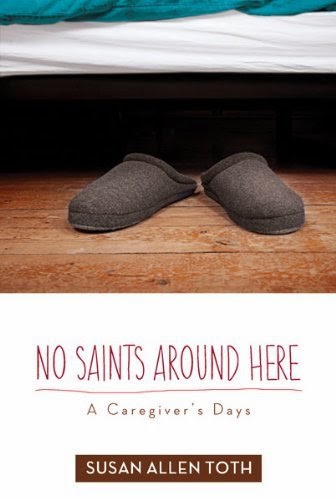About 20 pages into Susan Allen Toth’s caregiving memoir, “No Saints Around Here”, I decided I didn’t like the author. Not one bit. “How can a wife sigh loudly in front of her Parkinson’s disease-suffering husband just because she can’t have a second cup of tea in the morning?!” I fumed. I kept picking up this book, reading a little, getting annoyed and then slamming it down.
This book really got under my skin. So one day and about a third of the way through the book, I was helping my dear friend and caregiving mentor Kathleen Jordan pack her cupboards for a move into a smaller apartment. Kath has spent her lifetime giving care to those she loves – she’s the mother of three children, one with cerebral palsy complicated by mental illness, epilepsy and a visual impairment. Kathleen also looked after her mother until she died and more recently, her husband Bill. Bill suffers from a myriad of serious ailments and is now palliative in a care home.
As I loaded jars and dishes into a box, I railed against “No Saints Around Here” and it’s author. Kathleen put her hand on my shoulder and said, “so you are comparing the way the author feels to what you felt looking after Nicholas, your child. But Donna, it’s so different caring for a spouse. In a way, it’s much harder, especially when you’re older.” I looked at Kathleen, my teacher, and later went home to read again and consider my prejudices.
The thing is, at first I thought “No Saints Around Here” was shaping up to be a glib tale of care given, but with resentment and cynicism. What I didn’t understand was that I was reading the words of a woman/wife/companion who was livid at her loss and flailing with incompetence in the face of the Parkinson’s that attacked her life and her love in some new horrible way every day.
No, this was a woman who loved her husband James – achingly, desperately, quietly, sadly loved him. Nearly half-way through the book, the author describes visiting prospective nursing homes with her beloved. It’s almost too painful to read. No nursing homes are anywhere near worth considering, so life goes on at home. As James’ condition worsens and crises loom on a near-daily basis, Toth writes about a friend’s wisdom this way:
“A devoted Zen disciple, Mimi told me, “My biggest test is when I’m cleaning a toilet. I turn the task into a meditation. I pay attention to my work, every gesture, every moment.”
I wish for a touch of Mimi in the morning. Rather an savor the moment, I often feel as though time has alarmingly telescoped. I have just finished clearing up after breakfast and now I need to get James into his pyjamas. Where did the day go? How did I disappear? Why am I on this frozen tundra?”
One fascinating tell-tale sign of the journey of the caregiver’s heartbreak is the shift in possessive pronouns when the author talks about her home helpers. At first, she talks about ‘our aide’, but then I notice she uses “my aide” and finally, “James’ aide.” As James’ disease progresses, Toth reveals her loneliness by becoming subsumed by her beloved’s needs and losing the ‘our’ and ‘my’ in her language. Only ‘he’ remains.
But the reader of “No Saints Around Here” will not have to read subtle signs of the caregiver’s emotions – the author tells us everything. This is a diary, after all. Toth writes poignantly about the helplessness that every caregiver feels one day or another:
“I feel as though I am about to fall off my balance beam. I picture every caregiver on one, usually performing with an outward calm, like a confident acrobat, but concealing an inner terror: “What in the world will I do now?” For many of us, this must require both courage and faith, because I am often dizzy and close to gasping as I edge my way forward. The balance beam hangs in an enveloping haze.”
Yes, Susan Allen Toth, we all DO feel as you did. In 2012, our family had recently moved from our home in the UK back to Ottawa, Canada. This is what I wrote: During the past few months, I described to a friend how I felt about the onslaught of change in my life – “it’s as if someone has removed all the floorboards from my house”, I said. “It’s like I am walking on just the narrow joists and I worry about falling”.
